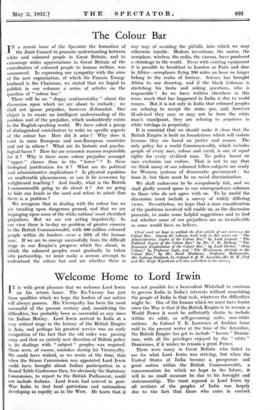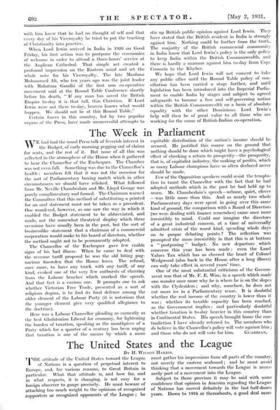Welcome Home to Lord Irwin
IT -is with great pleasure that 'we welcome Lord Irwin -I- on . his • return home. The Ex-Viceroy 'has just those qualities which we hope the leaders of our nation will always- possess. His Viceroyalty has been the most successful of the present century and, considering the difficulties, has probably been as successful as any since the Indian Mutiny. Lord Irwin arrived in India at a very critical stage in the history of the British Empire in Asia, and perhaps- his greatest service was an early recognition of the fact that the old order was passing away and that an entirely new direction of British policy in its dealings with "subject -"- peoples-- was required. There were, of course, mistakes during his Viceroyalty-. We could, have wished, as -we wrote at the time, that when the Simon Commission was appointed Lord Irwin could have brought about Indian participation in a Round Table Conference then, for obviously the Statutory Commission, to report to the British Parliament, could not include. Indians. Lord Irwin had arrived in post- War India to find local patriotism and nationalism developing as rapidly as in the West. He knew that it was not possible for a benevolent Whitehall to continue to govern India in India's interests without associating the people of India in that task, whatever the difficulties might be. One of the lessons which we must have learnt since the War is that if the British Empire is to remain a World Power it must be sufficiently elastic to include within its orbit, as self-governing units, non-white nations. As Colonel T. E. Lawrence of Arabian fame said to the present writer at the time of the Armistice, the British Empire has got to include " brown " ions, with all the privileges enjoyed by the " white " Dominions, if it wishes to remain a great Power.
There were many in Great Britain who failed to see for what Lord Irwin- was striving, but when the United States of India become a prosperous and great nation within the British Commonwealth, a consummation for which we hope in the future, it will in no small measure be due to his foresight and statesmanship. The trust reposed in Lord Irwin by all sections of the peoples of India was largely due to the fact that those who came in contact with him knew that he had no thought of self and that every day of his Viceroyalty he tried to put the teaching of Christianity into practice.
. When Lord Irwin arrived in India in 1926 on Good Friday, his first action was to postpone the ceremonies of welcome in order to attend a three-hours' service at the Anglican Cathedral. That simple act created a profound impression on the Eastern mind and set the whole note for his Viceroyalty. The late Maulona Muhammed Ali, who ten years ago was the joint leader with Mahatma Gandhi of the first non co-operative movement said at the Round Table Conference shortly before his death, "If any man has saved the British Empire to-day it is that tall, thin Christian. If Lord Irwin were not there to-day, heaven knows what would happen. We should not be at this Round Table."
Certain forces in this country, led by two popular organs of the Press, have Made unsuccessful attempts to stir up British public opinion against Lord Irwin. They have stated that the British resident in India is strongly against him. Nothing could be further from the truth. The majority of the British commercial community in India know that Lord Irwin's policy is the only policy to keep India within the British Commonwealth, and there is hardly a murmur against him to-day from Cape Comorin to the Khyber.
We hope that Lord Irwin will not consent to take any public office until the Round Table policy of con- ciliation has been carried a stage further, and until legislation has been introduced into the Imperial Parlia- ment to enable India by stages and subject to agreed safeguards to become. a free and self-governing nation within the British Commonwealth on a basis of absolute equality with the other Dominions. Lord Irwin's help will then be of great value to all those who arc working for the cause of British-Indian co-operation.





































 Previous page
Previous page